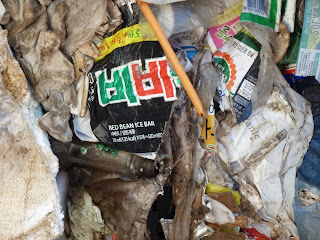"Repair, Reuse, Recycle" Post-Glenda Disaster Debris - EcoWaste Coalition
The EcoWaste Coalition, a waste and pollution
watchdog, today urged national and local authorities and the general public in areas battered by typhoon
Glenda to “repair, reuse and recycle” post-disaster
debris as much as possible.
“We know that it’s very tempting to just simply mix and dump post-disaster trash at the sidewalk, street corner, vacant lot or river as if dumping will make trash disappear,” said Aileen Lucero, Coordinator, EcoWaste Coalition.
“Instead of recklessly dumping everything under the sun, please segregate disaster discards and repair, reuse and recycle those things that can still be put to beneficial use,” she said
“Let us cut down on what we throw away to lessen the volume of trash requiring final disposal. Ecological waste management, especially in time of disaster, will take the pressure off our dumpsites and landfills that are already bursting at the seams,” she stated.
Tree leaves and twigs and other vegetative debris, wood scraps, galvanized iron sheets and other building debris, flood-soaked appliances, electronics, furniture and other household items, and
regular household trash such as food waste are among the typical discards requiring environmentally-sound management following a typhoon.
For example, the trunks of big trees uprooted by strong winds brought by typhoon Glenda can be made into school chairs and tables and other functional items.
Other biodegradable discards such as fallen leaves, fruit and vegetable peels can be converted into an excellent soil enhancer via composting.
“Turning organic discards into compost is also an effective way of reducing greenhouse gas emissions from dumpsites and landfills,” reminded Lucero.
Lucero cited the Philippine Climate Change Assessment Report, which states that garbage produced by the country is the third biggest contributor of greenhouse gas emissions, with methane from dumpsites and landfills comprising the biggest part followed by nitrous oxide from wastewater.
The EcoWaste Coalition has time and again emphasized the importance of zero waste resource management, stressing that the outmoded approach of dumping or incinerating discards is a complete waste of resources.
“Waste dumping and incineration also leads to wider environmental pollution that is contributing to climate change and causing harm to the people's health and livelihood.
-end-
“We know that it’s very tempting to just simply mix and dump post-disaster trash at the sidewalk, street corner, vacant lot or river as if dumping will make trash disappear,” said Aileen Lucero, Coordinator, EcoWaste Coalition.
“Instead of recklessly dumping everything under the sun, please segregate disaster discards and repair, reuse and recycle those things that can still be put to beneficial use,” she said
“Let us cut down on what we throw away to lessen the volume of trash requiring final disposal. Ecological waste management, especially in time of disaster, will take the pressure off our dumpsites and landfills that are already bursting at the seams,” she stated.
Tree leaves and twigs and other vegetative debris, wood scraps, galvanized iron sheets and other building debris, flood-soaked appliances, electronics, furniture and other household items, and
regular household trash such as food waste are among the typical discards requiring environmentally-sound management following a typhoon.
For example, the trunks of big trees uprooted by strong winds brought by typhoon Glenda can be made into school chairs and tables and other functional items.
Other biodegradable discards such as fallen leaves, fruit and vegetable peels can be converted into an excellent soil enhancer via composting.
“Turning organic discards into compost is also an effective way of reducing greenhouse gas emissions from dumpsites and landfills,” reminded Lucero.
Lucero cited the Philippine Climate Change Assessment Report, which states that garbage produced by the country is the third biggest contributor of greenhouse gas emissions, with methane from dumpsites and landfills comprising the biggest part followed by nitrous oxide from wastewater.
The EcoWaste Coalition has time and again emphasized the importance of zero waste resource management, stressing that the outmoded approach of dumping or incinerating discards is a complete waste of resources.
“Waste dumping and incineration also leads to wider environmental pollution that is contributing to climate change and causing harm to the people's health and livelihood.
-end-








Comments